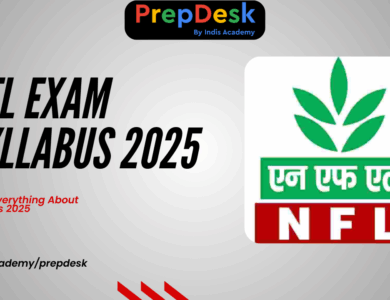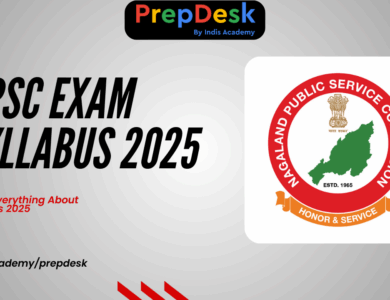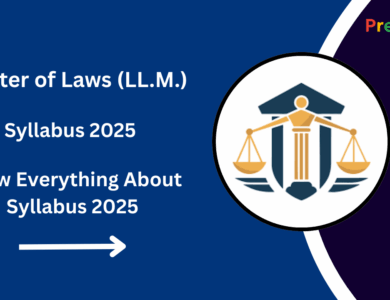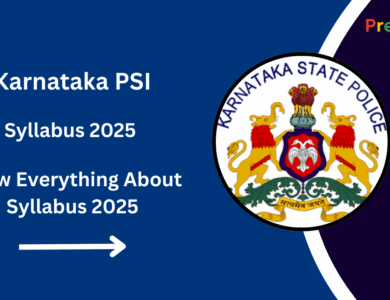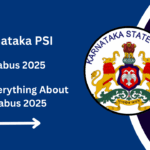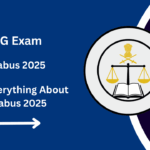MSc Mathematics Syllabus 2025 | PDF Download, Semester‑Wise Structure & Topics
Explore the comprehensive MSc Mathematics Syllabus for 2025 with detailed semester-wise topics—from Real Analysis, Algebra, Topology to Differential Equations. Download the PDF, recommended books, and expert preparation tips. Ideal for CUET PG, university exams & academic planning.
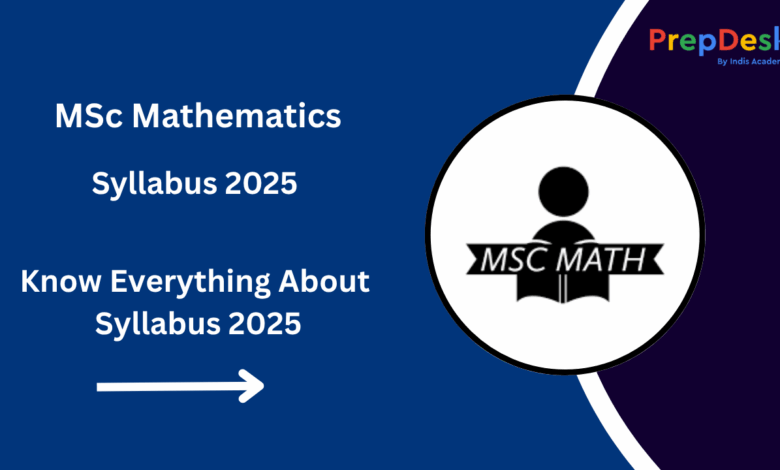
The Master of Science (MSc) in Mathematics is a two-year postgraduate degree program designed to impart advanced knowledge in pure and applied mathematics. The course covers a broad range of mathematical theories, structures, and applications. It prepares students for careers in academics, research, finance, analytics, and data science.
This article provides the complete MSc Mathematics syllabus with semester-wise subjects, topic-wise breakdown, marks distribution, syllabus PDF download, recommended books, preparation strategy, and specialization options.
MSc Mathematics Exam Overview
| Feature | Details |
|---|---|
| Degree Name | MSc in Mathematics |
| Duration | 2 Years (4 Semesters) |
| Course Type | Postgraduate |
| Eligibility | BSc in Mathematics or related subjects |
| Assessment Type | Semester-wise Exams + Dissertation |
| Curriculum Design | CBCS (Choice Based Credit System) |
| Core Areas | Algebra, Analysis, Topology, Differential Equations, Functional Analysis |
MSc Mathematics Semester-wise Subjects and Topics
Semester 1
| Subject | Topics Covered | Marks |
|---|---|---|
| Abstract Algebra | Groups, Rings, Fields, Homomorphisms, Ideals | 100 |
| Real Analysis | Sequences, Series, Continuity, Differentiability, Riemann Integration | 100 |
| Topology | Open and Closed Sets, Bases, Compactness, Connectedness | 100 |
| Ordinary Differential Equations | First and Second Order ODEs, Systems of ODEs, Existence Theorems | 100 |
Semester 2
| Subject | Topics Covered | Marks |
|---|---|---|
| Linear Algebra | Vector Spaces, Linear Maps, Eigenvalues, Canonical Forms | 100 |
| Complex Analysis | Analytic Functions, Cauchy’s Theorem, Laurent Series, Residues | 100 |
| Numerical Analysis | Interpolation, Numerical Differentiation, Integration, Solution of Equations | 100 |
| Partial Differential Equations | Classification, Method of Characteristics, Boundary Value Problems | 100 |
Semester 3
| Subject | Topics Covered | Marks |
|---|---|---|
| Functional Analysis | Normed Spaces, Banach Spaces, Hilbert Spaces, Linear Operators | 100 |
| Measure and Integration | Lebesgue Measure, Measurable Functions, Convergence Theorems | 100 |
| Advanced Differential Equations | Nonlinear ODEs, Green’s Functions, Boundary Value Problems | 100 |
| Elective I | Choose from Number Theory / Graph Theory / Cryptography | 100 |
Semester 4
| Subject | Topics Covered | Marks |
|---|---|---|
| Differential Geometry | Curves and Surfaces, Curvature, Geodesics | 100 |
| Mathematical Modelling | Population Models, Traffic Flow, Fluid Dynamics | 100 |
| Elective II | Choose from Operations Research / Fuzzy Mathematics / Advanced Algebra | 100 |
| Project / Dissertation | Research-based project on mathematical problem or model | 100 |
Detailed Topic Descriptions
- Abstract Algebra: Covers algebraic structures including groups, rings, and fields. Emphasis is placed on the structure, homomorphisms, and ideals.
- Real Analysis: Develops rigorous understanding of sequences, series, real-valued functions, and Riemann integration.
- Topology: Introduces open/closed sets, topological spaces, compactness, and connectedness, essential for advanced analysis.
- Differential Equations (ODE & PDE): Deals with solving various differential equations and understanding their applications.
- Linear Algebra: Covers matrix theory, vector spaces, eigenvalues, eigenvectors, and diagonalization techniques.
- Complex Analysis: Focuses on complex functions, Cauchy’s integral formula, conformal mapping, and residues.
- Functional Analysis: Explores Banach and Hilbert spaces, operator theory, and dual spaces.
- Measure Theory: Studies Lebesgue integration and measurable functions, laying the foundation for probability and statistics.
- Numerical Analysis: Teaches numerical methods to solve mathematical problems through approximations.
- Mathematical Modelling: Applies mathematics to simulate and solve real-world problems in biology, traffic, or environment.
MSc Mathematics Syllabus PDF Download
You can download the full MSc Mathematics Syllabus in PDF format from the link below:
Download MSc Mathematics Syllabus PDF
Recommended Books for MSc Mathematics
| Subject | Book & Author |
|---|---|
| Abstract Algebra | Topics in Algebra by I.N. Herstein |
| Real Analysis | Principles of Mathematical Analysis by Walter Rudin |
| Complex Analysis | Complex Variables and Applications by Churchill & Brown |
| Topology | Topology by James Munkres |
| Linear Algebra | Linear Algebra Done Right by Sheldon Axler |
| Differential Equations | Elementary Differential Equations by Boyce & DiPrima |
| Functional Analysis | Introductory Functional Analysis by Kreyszig |
| Numerical Methods | Numerical Methods for Engineers by Chapra and Canale |
| Measure Theory | Real Analysis by H.L. Royden or Folland |
| Mathematical Modelling | Mathematical Models in Applied Sciences by A.C. Fowler |
MSc Mathematics Preparation Tips
- Strengthen Fundamentals: Revise BSc-level core subjects like calculus, algebra, and ODEs.
- Regular Practice: Solve a wide range of theoretical and numerical problems regularly.
- Use Online Resources: Refer to NPTEL, Coursera, edX, and YouTube for video lectures and courses.
- Make Summary Notes: Keep short notes of theorems, formulas, and proofs for quick revision.
- Solve Previous Papers: Practice past semester exams to understand patterns and improve speed.
- Focus on Proofs: Mathematics at MSc level is proof-intensive. Understand the logic behind each step.
- Start Early for Dissertation: Identify your research area in the 3rd semester and seek mentors or guides.
Specializations in MSc Mathematics
| Specialization | Description |
|---|---|
| Pure Mathematics | Focus on algebra, topology, and theoretical aspects of mathematics |
| Applied Mathematics | Application of mathematical methods to real-world scenarios and models |
| Computational Mathematics | Numerical and algorithmic solutions using computers and simulations |
| Financial Mathematics | Math in finance: stochastic processes, risk management, and actuarial science |
| Mathematical Physics | Mathematics applied in quantum mechanics, thermodynamics, and relativity |
| Statistics & Data Science | Probability, data analysis, and statistical modeling |
Conclusion
The MSc Mathematics syllabus is structured to give students a deep understanding of abstract and applied mathematics. Whether you’re preparing for research, teaching, or corporate careers, the program builds essential skills in logic, computation, and analysis.
With the right approach, consistent study, and the recommended resources, students can excel in their MSc journey and beyond.
Stay tuned for university-specific syllabi like DU, JNU, BHU, and more. If you want the PDF or university syllabus, feel free to request it in the comments!
